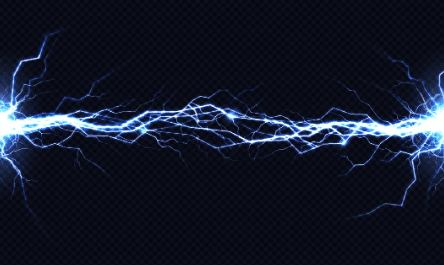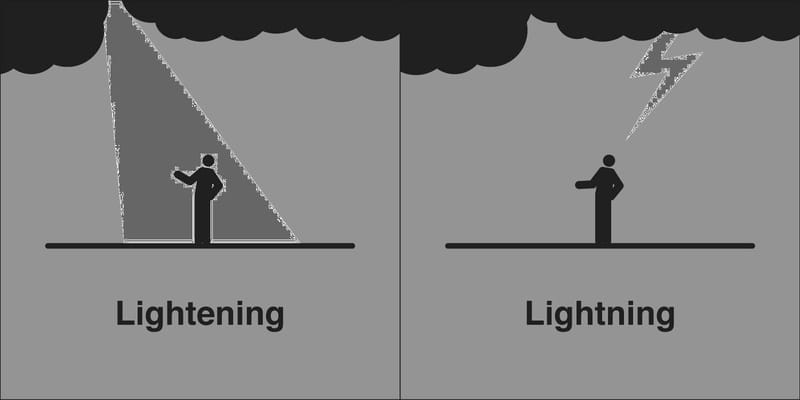Shedding Light on Lightening and Lightning: Understanding the Contrast
Contents

We've all been there – you're trying to articulate a thought in English, but the right words escape you. More so when similar-sounding words come into play. Take the case of 'lightening' and 'lightning'. These two seemingly identical words can create quite a confusion, thanks to their similar pronunciation.
Understanding the differences between such similar-sounding words can make a difference in your English communication skills.
By the end of this post, you'll know exactly how to use 'lightening' and 'lightning' accurately in conversations.
What is Lightening?
Lightening, derived from the word 'lighten', refers to the act of making something lighter in weight, intensity, or colour. It's a verb used when you want to express reducing the heaviness, severity or darkness of something.
Some common contexts where 'lightening' is used are:
Scenario 1: While cooking: "He is lightening the sauce with some cream."
Scenario 2: In fashion or beauty industry: "This product helps in lightening skin blemishes."
What is Lightning?
On the other hand, 'lightning' is a noun referring to the natural electrical discharge of very short duration and high voltage that occurs between a cloud and the ground or within a cloud. It's associated with thunderstorms and is often witnessed during monsoons.
Here are some common contexts where 'lightning' is used:
Scenario 1: In weather reports: "There were reports of frequent lightning strikes in coastal areas."
Scenario 2: Metaphorically, in sports commentary: "The footballer moved like lightning across the field."
Lightening Vs Lightning: Understanding The Difference
When learning English, it's common to get confused by words that sound similar but have different meanings. Two such words are 'lightening' and 'lightning.'
Let's break down the differences between them.
Lightening | Lightning | |
Meaning | To make lighter in weight or colour; The process of illumination or becoming brighter. | A flash of bright light in the sky produced by electricity. |
Context | Usually used in the context of weight and colours. Example: "She was lightening her hair." | Primarily seen in weather-related discussions. Example: "The monsoon brings thunder and lightning." |
Examples illustrating differences
1. Lightening:
"I am lightening my suitcase by removing some clothes."
"The sunrise was lightening the dark sky."
2. Lightning:
"During the storm, we saw a bolt of lightning."
"Lightning illuminated the night sky."
Why Confusing Lightening and Lightning Matters

Misunderstanding or misusing words like 'lightening' and 'lightning' can lead to unnecessary confusion, misunderstandings, and sometimes even awkward moments.
Consider this scenario: You're at a networking event with international colleagues when you tell them about last night's thunderstorm saying, "There was so much lightening yesterday!" Instead of discussing the weather, your confused colleagues might start wondering why you're talking about making things lighter!
By understanding the distinct meaning and usage of these similar-sounding words, we can communicate more accurately in English – a skill important for personal growth and professional advancement.
Common Mistakes and Tips for Correct Usage of Lightening and Lightning
Many non-native English speakers, especially in India, often confuse the words 'lightening' and 'lightning.'
'Lightning' refers to the natural phenomenon we witness during thunderstorms. For example, a sentence like "The lightening flashed across the sky" is incorrect. Instead, it should be "The lightning flashed across the sky."
On the other hand, ‘lightening’ is a verb that means making something lighter or less dark. If someone says, "She is lightening her hair this weekend," they are using the term correctly.
Tip:
A mnemonic you could use is associating the extra 'e' in 'lightening' with 'ease', implying reduction or lessening. Conversely, remember that 'lightning' strikes fast and hard, with no room for an extra letter! By keeping these simple rules in mind, you can avoid mixing up these two words in your spoken and written English.
Why Clapingo's Coaching Can Help You Master These Differences
At Clapingo, we understand these details can be confusing for non-native English speakers. That's where our one-on-one coaching sessions come into play! Our native language coaching helps you get a deeper understanding of such differences by tailoring lessons according to your level of comprehension. With Clapingo's custom-made plans, you can master English language intricacies efficiently and avoid similar confusion in the future.
Still not sure if Clapingo is the right choice for you? Here's a student's testimonial to help you make a decision.
To Sum Up
Understanding the distinction between 'lightening' and 'lightning' can be important in your English language journey.
Despite their similar spellings, one refers to the act of making something lighter, while the other is a powerful natural phenomenon. Mistaking these two can lead to confusing sentences like saying 'the sky was lightening' when you meant lightning struck.
At Clapingo, we believe in guiding non-native speakers like you through such challenges. Our one-on-one coaching sessions offer personalised assistance from native speakers who understand your unique needs.
So let's keep going! Keep practising, learning from your mistakes and turning every challenge into an opportunity for growth.
FAQs
1. What is the difference between 'lightening' and 'lightning'?
"Lightening" refers to the process of making an object lighter in weight or colour. For instance, "The new diet plan is lightening my weight". On the other hand, "lightning" refers to a natural electrical discharge causing bright flashes in the sky during thunderstorms. Example: "I saw a spectacular display of lightning last night."
2. Are 'lightening' and 'lightning' pronounced differently?
Yes, they are pronounced differently. "Lightening" has three syllables: light-en-ing, while "lightning" has only two: light-ning.
3. Can I use 'lightening' and 'lightning' interchangeably in conversations?
No, you can't. They have different meanings and usages. Using them interchangeably could lead to confusion. For example, if you say, "I saw a flash of lightening", it would not make sense because "lightening" does not refer to a natural phenomenon but rather to the act of making lighter.
Comments
Your comment has been submitted